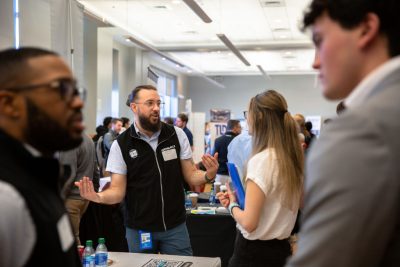Internships

Internships in the College of Engineering (CoE) provide students with valuable on the job experience in related to their academic major, bridging the gap between academic knowledge and real-world application. These short-term work experiences provide students the opportunity to apply their classroom learning in a professional setting, engage with industry and help to build their own network of professional contacts in their engineering discipline.
Quick facts about internships in the CoE:
- Internship experiences are not for credit in any major (per College accreditation standards)
- Experiences generally take place over the summer, but can also be completed during winter, or academic semesters
- Opportunities are student-facilitated, which means students must apply for their own internship with the help from UConn’s Center for Career Development, departmental faculty, and the experiential education team
Co-ops
Cooperative education (co-op) in the College of Engineering allows students to immersive themselves in a long-form work experience that spans an entire academic semester. Co-ops enable students to engage in a full-time experience in their field, often resulting in more significant projects and responsibilities than a standard internship. Through co-ops, students gain extensive industry experience, develop technical and soft skills, and tend to extend their experience (via additional opportunities/post graduate job offers) through their participation. Co-ops enhance the educational journey by providing a comprehensive view of industry practices and professional environments.
Quick facts about Co-ops in the CoE:
- Co-ops offered by our industry partners can span four to eight months, but are tracked by academic semester in the College
- Experiences can span multiple semesters at the same organization, although it generally recommended that the scope of the work changes to provide a broader spectrum of experience for the student
- Like internships in the College, opportunities are student-facilitated, which means students must apply for their own internship with the help from UConn’s Center for Career Development, departmental faculty, and the experiential education team
- Although the experience is not for credit, participating students are enrolled in the UConn course Cooperative Education Work Placement (CEWP 4297) facilitated by the Director of Experiential Education in the College. The course allows students to:
-
- Document their experience using mixed methods of evaluation
- Retain UConn status while participating in their experience (meaning, students do not need to reapply to their program upon completion of the Co-op)
- Connect with on-site personnel evaluating the student’s work (and vice-versa)
- Ensure the safety of the student while on-site through various check-ins the program provides